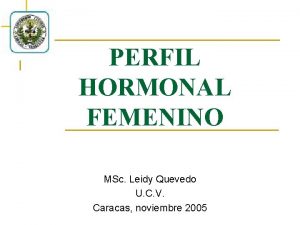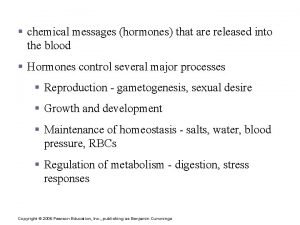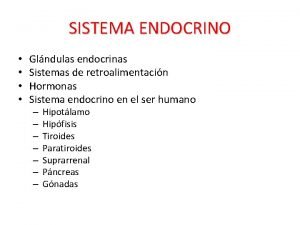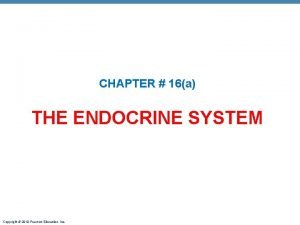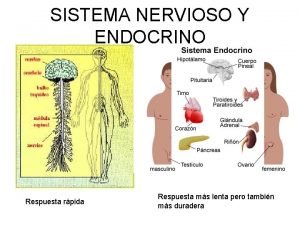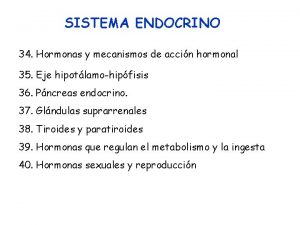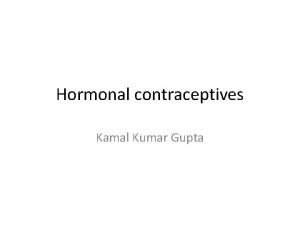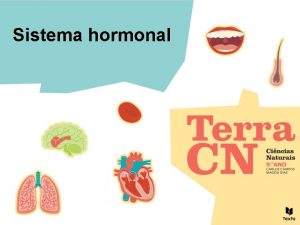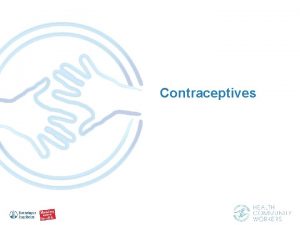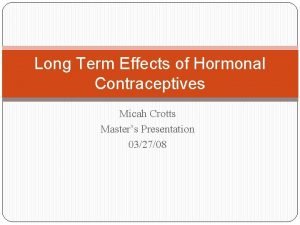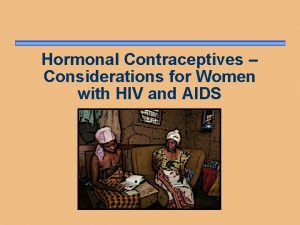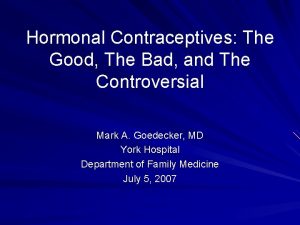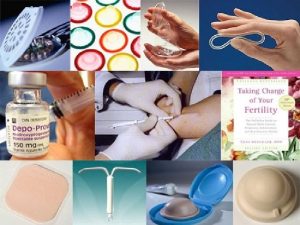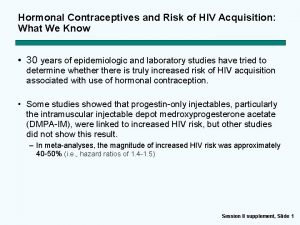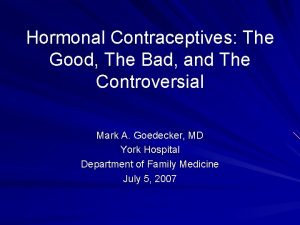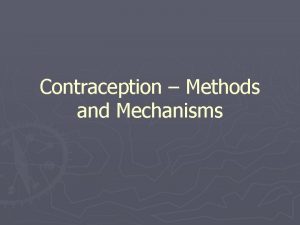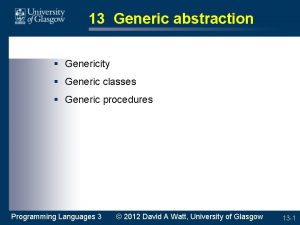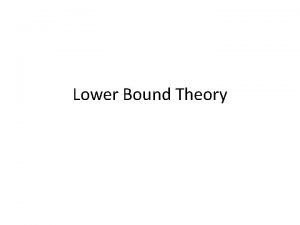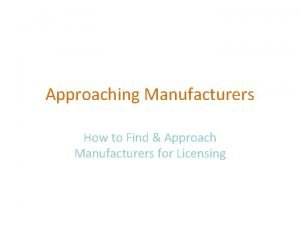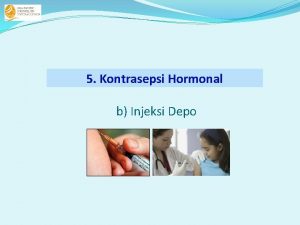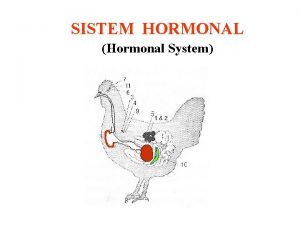Can manufacturers of generic hormonal contraceptives in lower



















- Slides: 19

Can manufacturers of generic hormonal contraceptives in lower and middle income countries help in achieving contraceptive supply security? Concept Foundation, ICON/IPPF, Partners for Population and Development, UNFPA Market Development Approaches Working Group Subgroup on non-OECD generic manufacturers Bonn, 19 October 2006

What do we expect from the generic manufacturers? Donors and procurement agencies are looking for sustainable supply of the highest quality products at the lowest possible cost to meet the goal of achieving contraceptive supply security. This is what we are expecting manufacturers of generic contraceptives to deliver. Market Development Approaches Working Group Subgroup on non-OECD generic manufacturers Bonn, 19 October 2006

Questions by the RHSC on the manufacture of generic hormonal contraceptives • Can generic pharmaceutical manufacturers in lower and middle income countries make quality products available to donor agencies, governments, social marketing organizations at a more affordable price, while meeting the requirements of stringent regulatory agencies? • Can any of these companies participate in the development of a total market approach which provides a “second tier” of products in the private sector that are affordable to some of those who are currently using free or subsidized public or social marketing sector products, and allow those programmes to focus on poorer users? Market Development Approaches Working Group Subgroup on non-OECD generic manufacturers Bonn, 19 October 2006

Generic hormonal contraceptives Study 1. “Qualitative study” • 41 Companies were visited in 14 lower and middle income countries: Brazil, Chile, PR China, Costa Rica, India, Indonesia, Malaysia, Mexico, Oman, South Africa, Ro. C (Taiwan), Thailand, Uruguay and Viet Nam. • Did not include the licensees of the major western R&D companies nor contract manufacturers. • Study undertaken by Concept Foundation, Bangkok and Partners in Population and Development, Dhaka, funded by UNFPA. Market Development Approaches Working Group Subgroup on non-OECD generic manufacturers Bonn, 19 October 2006

Generic hormonal contraceptives Study 2. “Quantitative study” • Assessment of the manufacturing competence of 10 companies in PR China, Colombia, India, Oman, Pakistan, South Africa and Thailand • Study undertaken by Concept Foundation, Bangkok, funded by ICON/IPPF and UNFPA. • Close link maintained between studies Market Development Approaches Working Group Subgroup on non-OECD generic manufacturers Bonn, 19 October 2006

Findings • Although all 44 factories visited comply with national GMP, it is probable that less than 30% would meet WHO, PIC/S or any stringent regulatory authority requirements. • A further 20% could comply with some investment and improvements in quality management and practice. • The other 50% of the facilities visited are manufacturing products under conditions that give cause for concern. Market Development Approaches Working Group Subgroup on non-OECD generic manufacturers Bonn, 19 October 2006

Findings • There is enormous production overcapacity, particularly in China and Thailand, and to some extent in India, where companies produce their annual quota of oral or injectable contraceptives in a single period of 4 -8 weeks in a year. This is not only uneconomic but raises major quality issues, particularly in the revalidation (or lack of revalidation) of production and environmental procedures, as well as worker training. Market Development Approaches Working Group Subgroup on non-OECD generic manufacturers Bonn, 19 October 2006

Findings • Most companies are finding APIs from European sources to be expensive but cannot easily obtain material from other countries that are made to acceptable GMP criteria nor having the necessary drug master files to allow completion of registration dossiers. • Very few companies have undertaken bioequivalence testing. • Most, but not all, factories are undertaking adequate stability studies. Market Development Approaches Working Group Subgroup on non-OECD generic manufacturers Bonn, 19 October 2006

Findings • Few companies (<25%) have the capability of developing registration dossiers required for the export of products to countries with strict regulatory requirements. • Many companies would like to access technical assistance to: - meet c. GMP requirements; and - develop registration dossiers that meet stringent regulatory requirements Market Development Approaches Working Group Subgroup on non-OECD generic manufacturers Bonn, 19 October 2006

Conclusions • Most companies manufacture products according to outdated requirements that do not conform to c. GMP, or even outside GMP. • A few companies do manufacture products of assured quality according to c. GMP requirements. • Most are not in a position to supply products into international markets, not having considered regulatory approval for their products outside their home markets. • Very few have positioned themselves adequately to get approvals to be able to deliver their products outside of their home markets. Market Development Approaches Working Group Subgroup on non-OECD generic manufacturers Bonn, 19 October 2006

Can we access high quality products? Yes, if the active pharmaceutical ingredients (APIs) and production facilities conform to internationally accepted GMP standards; and data are available to comply with regulatory requirements. From the two studies reported, up to ten companies could comply in 2007 with minimal additional technical or procedural inputs (except for the completion of BE studies) and a further three to four could potentially do so in 2007 with investment and technical assistance. Market Development Approaches Working Group Subgroup on non-OECD generic manufacturers Bonn, 19 October 2006

What should RHSC members do? • Donor and procurement agencies wishing to access generic products should agree that they will only purchase products that have been prequalified by WHO and adopt a policy based on that used by the GFATM. • Procurement policy of the Global Fund for ATM states: “Accordingly a product may be procured if: Option A: it is approved by the pre-qualification program. Option B: it is approved by a stringent regulatory authority, defined as a National Drug Regulatory Authority (NDRA) participating in the International Conference of Harmonization (ICH) and the Pharmaceutical Inspection Cooperation Scheme (PIC/S), See attached list. ” Market Development Approaches Working Group Subgroup on non-OECD generic manufacturers Bonn, 19 October 2006

What should RHSC members do? • Develop an advocacy strategy and informational materials for governments, national NGOs, international partners and other stakeholders, including healthcare providers and consumers on: - the WHO prequalification programme; - the need to use only suppliers prequalified by WHO for the procurement of injectable and oral contraceptives and eventually other RH commodities. - the broader issues around generic products. • Systems Strengthening WG addresses the needs to strengthen procurement capacity at country level and ensure that if generic products are used, they are prequalified by WHO. Market Development Approaches Working Group Subgroup on non-OECD generic manufacturers Bonn, 19 October 2006

http: //mednet 3. who. int/prequal/ Reproductive Health Market Development Approaches Working Group Subgroup on non-OECD generic manufacturers Bonn, 19 October 2006

What do we expect from the generic manufacturers? Donors and procurement agencies are looking for sustainable supply of the highest quality products at the lowest possible cost to meet the goal of achieving contraceptive supply security. This is what we are expecting manufacturers of generic contraceptives to deliver. Market Development Approaches Working Group Subgroup on non-OECD generic manufacturers Bonn, 19 October 2006

Can we access these quality products at the lowest cost and sustainably? • Low-cost contraceptives of assured quality are available from (a few) manufacturers of generic products. • They are ready to use pricing as the main positioning mechanism for their products and look for volume supplies. • Competitive pricing is their primary tool to establish market share. • Generic manufacturers operate with lower net margin expectations than their multinational competitors. However, they do expect their operations to generate sizeable profits. Market Development Approaches Working Group Subgroup on non-OECD generic manufacturers Bonn, 19 October 2006

Can we access these quality products at the lowest cost and sustainably? • Multinationals offer low-cost supplies at margins calculated on the basis of surplus capacities from high-profit sales into developed markets. • Generic suppliers do not have these opportunities and require steady regular sales turnover to keep their business running. • High volume is an important parameter of their business model but they don’t have the flexibility to accommodate large capacity fluctuations to meet demand at lowest costs. Market Development Approaches Working Group Subgroup on non-OECD generic manufacturers Bonn, 19 October 2006

Can we access these quality products at the lowest cost and sustainably? • Quality costs money – those companies that are prepared to invest in manufacturing quality products should benefit from that investment. • Quality and economics require planned production – companies without regular and consistent orders incur major revalidation costs if they are to maintain quality and intermittent production is uneconomic. • Lowest-costs at low profit margins for manufacturers need a low-risk environment for doing business – companies need accessible markets of known size and volumes. Market Development Approaches Working Group Subgroup on non-OECD generic manufacturers Bonn, 19 October 2006

What should RHSC members do? As an incentive to manufacturers that would allow them to offer the inherent cost advantages to international purchasers and to exploit the full lowcost potential of generic supplies, manufacturers need a continuous purchase and supply mechanism as a platform to replace the current uncoordinated, ad hoc and discontinuous tender mechanism. • How can individual donors support this platform? • Can new joint financing and purchasing mechanisms be developed? Market Development Approaches Working Group Subgroup on non-OECD generic manufacturers Bonn, 19 October 2006
 Aminopeptin
Aminopeptin Neural and hormonal communication
Neural and hormonal communication Conclusión de los aparatos reproductores
Conclusión de los aparatos reproductores Aerotactismo
Aerotactismo Hormonal surge meaning
Hormonal surge meaning Regulacion hormonal
Regulacion hormonal Dişinin menstrual döngüsü
Dişinin menstrual döngüsü The hormonal signal for the start of puberty begins in the:
The hormonal signal for the start of puberty begins in the: Hipotálam
Hipotálam Sistema neuro-hormonal
Sistema neuro-hormonal Introduccion aparato reproductor masculino
Introduccion aparato reproductor masculino Coordenação nervosa e hormonal
Coordenação nervosa e hormonal Humoral stimulus
Humoral stimulus Hormonal
Hormonal Pearson
Pearson Hormonas gonadoestimulinas
Hormonas gonadoestimulinas Sistema nervioso cordal
Sistema nervioso cordal Hormonal stimulus
Hormonal stimulus Mecanismos de secreción hormonal
Mecanismos de secreción hormonal Example of hormonal stimulus
Example of hormonal stimulus


